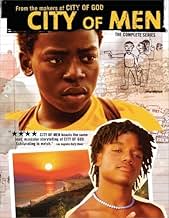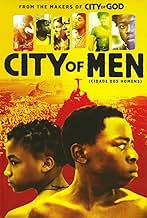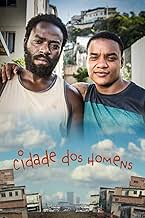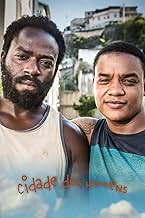IMDb RATING
8.2/10
3.1K
YOUR RATING
A realistic yet humorous look at the lives of Laranjinha and Acerola, two friends who live adventurous and dangerous lives in a Rio de Janeiro slum.A realistic yet humorous look at the lives of Laranjinha and Acerola, two friends who live adventurous and dangerous lives in a Rio de Janeiro slum.A realistic yet humorous look at the lives of Laranjinha and Acerola, two friends who live adventurous and dangerous lives in a Rio de Janeiro slum.
- Awards
- 3 wins & 3 nominations total
Browse episodes
Adriana Rodrigues
• 2017
Jefferson Brasil
• 2017
Dja Marthins
• 2017
Leo Xavier
• 2017
Amaury de Lima
• 2017
8.23K
1
2
3
4
5
6
7
8
9
10
Featured reviews
Great piece of Art !
If you have seen the «City of God» movie... and you really enjoy it... You just have to run and see this mini-series.
With the same actors, the same and other directors, and with the same landscape (Brazilian «Favelas»), Cidade dos Homens is a great mini-series, that show us how is the live, dead, living, love, fun, sadness on the Brazilian «Favelas».
Another interesting thing about this young actors, is that most of them, actually were young kids that used to live on the streets of Rio de Janeiro, because of this are now having a normal live, with other perspectives. I'm sure most of them will have a great future on the movies or cinema works.
Great Job... I'm only sad because it ended... ;-)
With the same actors, the same and other directors, and with the same landscape (Brazilian «Favelas»), Cidade dos Homens is a great mini-series, that show us how is the live, dead, living, love, fun, sadness on the Brazilian «Favelas».
Another interesting thing about this young actors, is that most of them, actually were young kids that used to live on the streets of Rio de Janeiro, because of this are now having a normal live, with other perspectives. I'm sure most of them will have a great future on the movies or cinema works.
Great Job... I'm only sad because it ended... ;-)
An intriguing spinoff from Cidade de Deus
Cidade dos Homens is Meirelles' return to the domestic television audience after the international success of Cidade de Deus, a film he admits he did not intend for exposure outside Brazil. Turning to the domestic arena with a slightly more altruistic/socio-political agenda, Meirelles is perhaps not as 'punchy' a director as he was in the original feature but is taking on a much more challenging topic. The series, rather than purely the mini-feature, is helping to break some ground in the nation's film and television industry and is certainly worth a look.
Lacks narrative cohesion & visual style but is an excellent experience
In Rio de Janeiro, the shantytowns on the Hill have death rates that are comparable to some areas that are classed as war zones. The losers in this particular war zone are mostly children and teenagers, who find themselves sucked into violent lives of crime that are as short as they are hopeless. However not everyone on The Hill has "always wanted to be a gangster" and some just live their lives day to day. In this series we meet Laranjinha and Acerola, two young men who enjoy the dances, are drawn by the game, run things to get money, hang out on the beach and mostly chase girls and try to lose their virginity.
With a deeply ironic title that hints at the dark realities of life in these places (many don't make it to be men) I was a definite viewer when I saw this series coming onto BBC4. I won't babble too long but I just want to take the chance to register my praise for this channel those who say that BBC4 is not providing a service are dead wrong, it is not their fault the mass audience want mindless stuff to relax in front of. BBC4 gives me cinema from all over the world on a weekly basis and also throws things like this my way otherwise I would have had to buy the DVD. My dig at City of God in my plot summary is not a reflection of my view of the film because I actually really liked it, however City of Men is better in regards the actual story. Free of the constraints of the film, we are released of the demands of narrative and it produces a film that is more about the experience than it is about one specific story. Although I liked the film I did like this approach better over the course of the nine episodes because I felt it was able to relax and be more realistic without the pressure of actually going someone. As esteemed reviewer el-p has already observed, this means that the final episode does feel a bit of an anti-climax because it just sort of drifts away without closure; but then life only has one closure and that just doesn't happen bang on the end of any given look at life.
This approach allows us to simply follow the two boys during this part of their life and produces a picture of life in the shantytowns as well as some wider comments. The series has episodes based totally around the nightlife, around the dealers, around hustling or even just about the beach life. Some of them are fun, some are deadly serious, some are political and some are moving but the important thing is that they all work well. The writing never feels like writing and there are no speeches, just natural dialogue that helped me to get into the characters and accept them as real even when their situations are a million miles from my life. The use of an amateur cast helps as well but it also helps that they can be natural in front of a camera and there are few here that struggle. Cunha stands out because he has the most interesting character; Silva is also good but the series tends to use Acerola as more of a comic character or have his inner issues be more about getting laid than anything else.
The direction and production values will probably initially put City of God fans off because the series lacks the real cinematic style of its bigger brother, being shot mostly on digital video and being very hand-held and grainy. However give it five minutes and it won't matter because you'll be into it like this and appreciate the intimacy it brings with it. Some of the episodes use animation (most don't) and, apart from a nasty little Matrix-style moment in the last episode (that look cheaply done) the animation is well done and matches the indie feel of the series by being rough but inventive. The biggest problem for me was the fact that the opening credits are so terrible that the first episode I watched I assumed it was going to be awful and, although the series was great, I always fast-forward the opening credits. It is a nice idea but the sight of Chunda and Silva running on the spot unconvincingly just looks daft to me.
Overall this is a very good series and in many ways is better than the film that spawned it. It may lack the narrative flow and visual style of City of God but it paints a fuller picture that shows us something closer to reality not all those on the hill go into crime etc but many, many lives are touched by it and it is a dire situation. The lack of narrative is not a problem until an ending is required: up till then the experience is well done and makes for great viewing thanks to the charismatic leads. Well worth seeing and it was a genuine shock to me to see fewer than 50 votes registered for this on IMDb last year everyone and their dog were praising City of God and Brazilian cinema in general, I know I've seen a lot more South American films as a result of getting into this market, but it seems I am one of the few. I guess the mass market will only seek out non-Hollywood product if it is served on their terms and they don't have to hunt it out; bit depressing really to see so many viewing dumb action movies while stuff like this goes unnoticed. Anyway, rant over, this was a great little series had its weaknesses but the messages and story telling are so well done that as many viewers as possible should be introduced to it.
With a deeply ironic title that hints at the dark realities of life in these places (many don't make it to be men) I was a definite viewer when I saw this series coming onto BBC4. I won't babble too long but I just want to take the chance to register my praise for this channel those who say that BBC4 is not providing a service are dead wrong, it is not their fault the mass audience want mindless stuff to relax in front of. BBC4 gives me cinema from all over the world on a weekly basis and also throws things like this my way otherwise I would have had to buy the DVD. My dig at City of God in my plot summary is not a reflection of my view of the film because I actually really liked it, however City of Men is better in regards the actual story. Free of the constraints of the film, we are released of the demands of narrative and it produces a film that is more about the experience than it is about one specific story. Although I liked the film I did like this approach better over the course of the nine episodes because I felt it was able to relax and be more realistic without the pressure of actually going someone. As esteemed reviewer el-p has already observed, this means that the final episode does feel a bit of an anti-climax because it just sort of drifts away without closure; but then life only has one closure and that just doesn't happen bang on the end of any given look at life.
This approach allows us to simply follow the two boys during this part of their life and produces a picture of life in the shantytowns as well as some wider comments. The series has episodes based totally around the nightlife, around the dealers, around hustling or even just about the beach life. Some of them are fun, some are deadly serious, some are political and some are moving but the important thing is that they all work well. The writing never feels like writing and there are no speeches, just natural dialogue that helped me to get into the characters and accept them as real even when their situations are a million miles from my life. The use of an amateur cast helps as well but it also helps that they can be natural in front of a camera and there are few here that struggle. Cunha stands out because he has the most interesting character; Silva is also good but the series tends to use Acerola as more of a comic character or have his inner issues be more about getting laid than anything else.
The direction and production values will probably initially put City of God fans off because the series lacks the real cinematic style of its bigger brother, being shot mostly on digital video and being very hand-held and grainy. However give it five minutes and it won't matter because you'll be into it like this and appreciate the intimacy it brings with it. Some of the episodes use animation (most don't) and, apart from a nasty little Matrix-style moment in the last episode (that look cheaply done) the animation is well done and matches the indie feel of the series by being rough but inventive. The biggest problem for me was the fact that the opening credits are so terrible that the first episode I watched I assumed it was going to be awful and, although the series was great, I always fast-forward the opening credits. It is a nice idea but the sight of Chunda and Silva running on the spot unconvincingly just looks daft to me.
Overall this is a very good series and in many ways is better than the film that spawned it. It may lack the narrative flow and visual style of City of God but it paints a fuller picture that shows us something closer to reality not all those on the hill go into crime etc but many, many lives are touched by it and it is a dire situation. The lack of narrative is not a problem until an ending is required: up till then the experience is well done and makes for great viewing thanks to the charismatic leads. Well worth seeing and it was a genuine shock to me to see fewer than 50 votes registered for this on IMDb last year everyone and their dog were praising City of God and Brazilian cinema in general, I know I've seen a lot more South American films as a result of getting into this market, but it seems I am one of the few. I guess the mass market will only seek out non-Hollywood product if it is served on their terms and they don't have to hunt it out; bit depressing really to see so many viewing dumb action movies while stuff like this goes unnoticed. Anyway, rant over, this was a great little series had its weaknesses but the messages and story telling are so well done that as many viewers as possible should be introduced to it.
10Splattii
Maybe the best mini series I've ever seen
When I saw the DVD set come out in the UK I had to pick it up. When it got here, I broke it open and popped it in the next day. I finished both seasons within 12 hours.
I don't really know what to say other than see this now. If you liked City of God, you will not only like this series, but you'll love it. It's amazing. It could be the best mini series I've ever seen.
I used to brag to people about a film called "Cidade Des Dues" before it was widely known. People now seem to have embraced the film and given it the respect it deserves. I will now spread the word of the amazing mini-series.
I can't emphasize enough how good this was. I paid 15 euro's shipped to my door, and I would have paid more than double after seeing it.
I don't really know what to say other than see this now. If you liked City of God, you will not only like this series, but you'll love it. It's amazing. It could be the best mini series I've ever seen.
I used to brag to people about a film called "Cidade Des Dues" before it was widely known. People now seem to have embraced the film and given it the respect it deserves. I will now spread the word of the amazing mini-series.
I can't emphasize enough how good this was. I paid 15 euro's shipped to my door, and I would have paid more than double after seeing it.
Dazzling
This is a powerful 19-part fictional series, based on real events and characters, that is ingeniously filmed on the streets, beaches and the notorious favelas of Rio de Janeiro.
'City of Men' recounts the many experiences (some very funny) of two teenagers from the slums trying to remain reasonably honest while poverty, racism, gang warfare and police brutality surround them. The close friendship of the two teenagers is brought to the screen with rare intensity by Darlan Cunha as Laranjinha, a disconnected but charismatic and streetwise figure, and the often bewildered, likable and always horny ('I don't want to die a virgin') Douglas Silva as Acerola. Both of these boys are not trained actors, and were 14 years old when the series started in 2002 (it ended in 2006). It's fascinating to watch them work.
The series is bathed in brilliant day-time colour and ominous night-time danger. People in this film live close to the edge. Murder is an everyday event.
The only problem I had with the series is the rapid-fire quick cuts and the shaky hand-held cameras. If this style doesn't bother you, sit tight and enjoy the ride. For me, the sizzle and the dazzle are often unnecessary and distracting. Too much focus (literally) on style, and the messages of the film are blurred somewhat because of it.
'City of Men' recounts the many experiences (some very funny) of two teenagers from the slums trying to remain reasonably honest while poverty, racism, gang warfare and police brutality surround them. The close friendship of the two teenagers is brought to the screen with rare intensity by Darlan Cunha as Laranjinha, a disconnected but charismatic and streetwise figure, and the often bewildered, likable and always horny ('I don't want to die a virgin') Douglas Silva as Acerola. Both of these boys are not trained actors, and were 14 years old when the series started in 2002 (it ended in 2006). It's fascinating to watch them work.
The series is bathed in brilliant day-time colour and ominous night-time danger. People in this film live close to the edge. Murder is an everyday event.
The only problem I had with the series is the rapid-fire quick cuts and the shaky hand-held cameras. If this style doesn't bother you, sit tight and enjoy the ride. For me, the sizzle and the dazzle are often unnecessary and distracting. Too much focus (literally) on style, and the messages of the film are blurred somewhat because of it.
Did you know
- TriviaThis series is based on the short Golden Gate (Palace II) (2000) in which Darlan Cunha played Acerola and Douglas Silva played Laranjinha. In this series, Cunha played Laranjinha and Silva played Acerola.
- ConnectionsFeatured in City of Men (2007)
- SoundtracksO Vencedor
Performed by Los Hermanos
- How many seasons does City of Men have?Powered by Alexa
Details
- Release date
- Country of origin
- Official site
- Language
- Also known as
- Cidade Dos Homens
- Filming locations
- Production companies
- See more company credits at IMDbPro
Contribute to this page
Suggest an edit or add missing content

































